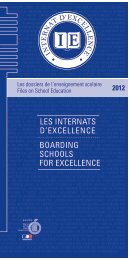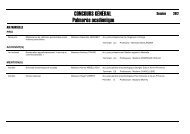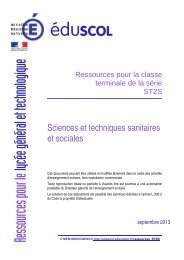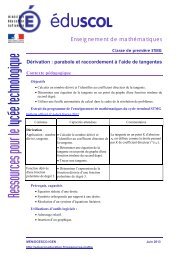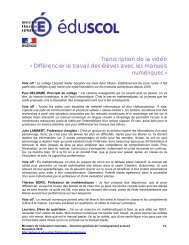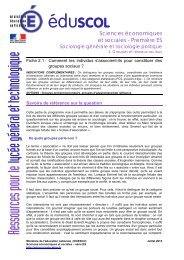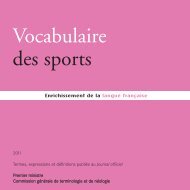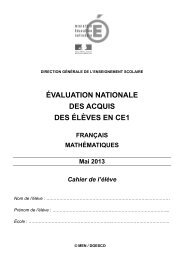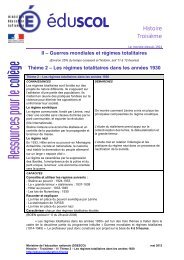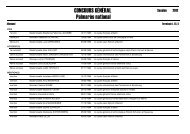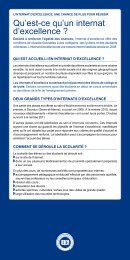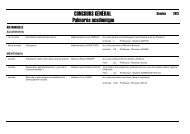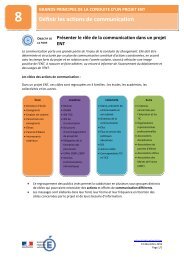Citizenship Education in England, France and Scotland. 2009 A ...
Citizenship Education in England, France and Scotland. 2009 A ...
Citizenship Education in England, France and Scotland. 2009 A ...
You also want an ePaper? Increase the reach of your titles
YUMPU automatically turns print PDFs into web optimized ePapers that Google loves.
1 AIMS AND ISSUESWhat do schools want to achievethrough citizenship education?The concept of citizenship<strong>Education</strong> for <strong>Citizenship</strong> is set <strong>in</strong> the context of national Aims <strong>and</strong> Values as set out <strong>in</strong> the Curriculum(The National Curriculum for primary/secondary teachers QCA 1999 www.nc.uk.net).The Curriculum <strong>and</strong> its aims <strong>and</strong> values have recently been reviewed by the QCA. They are that the curriculumshould develop young people who are successful learners, confident <strong>in</strong>dividuals, <strong>and</strong> responsible citizens.www.qca.org.uk/curriculumOn the whole, the aim is to preparepupils to participate <strong>in</strong> the best possibleway <strong>in</strong> democratic life, to be aware oftheir rights <strong>and</strong> duties as citizens <strong>and</strong>also to live together <strong>in</strong> society.M<strong>in</strong>isterial guidel<strong>in</strong>es refer to citizenshipeducation but also to teach<strong>in</strong>g pupilshow to behave responsibly, demonstratejudgement <strong>and</strong> awareness of <strong>in</strong>dividual<strong>and</strong> collective responsibilities.Responsible behaviour education is amore recent development. Expectationsare outl<strong>in</strong>ed more clearly <strong>and</strong> henceevaluation should be made easier.<strong>Citizenship</strong> education has evolved to<strong>in</strong>clude actions.The common core of knowledge <strong>and</strong>skills <strong>in</strong>tegrates these key areas.<strong>Citizenship</strong> gives pupils the knowledge, skills <strong>and</strong> underst<strong>and</strong><strong>in</strong>g to play an effective role <strong>in</strong>society at local, national <strong>and</strong> <strong>in</strong>ternational levels. It helps them to become <strong>in</strong>formed, thoughtful<strong>and</strong> responsible citizens who are aware of their duties <strong>and</strong> rights. It encourages pupils to playa part <strong>in</strong> the life of their schools, neighbourhoods, communities <strong>and</strong> the wider world. It alsoteaches them about our economy, <strong>and</strong> democratic <strong>in</strong>stitutions <strong>and</strong> values: encourages respectfor different national, religious <strong>and</strong> ethnic identities; <strong>and</strong> develops pupils’ ability to reflect onissues <strong>and</strong> take part <strong>in</strong> discussions.<strong>Education</strong> forcitizenshipaims to developcapability forthoughtful <strong>and</strong>responsibleparticipation<strong>in</strong> political,economic,social <strong>and</strong>cultural life.<strong>Engl<strong>and</strong></strong><strong>France</strong>It contributes tothe aspiration,as def<strong>in</strong>ed <strong>in</strong>Curriculum for Excellence, thatall young people leave schoolequipped to be:• Successful learners• Confident <strong>in</strong>dividuals• Effective contributors• Responsible citizensScotl<strong>and</strong>2 <strong>Citizenship</strong> <strong>Education</strong> <strong>in</strong> <strong>Engl<strong>and</strong></strong> / <strong>France</strong> / Scotl<strong>and</strong> - <strong>2009</strong>
1 AIMS AND ISSUESPrevention <strong>and</strong> protectionWhat areas are covered?The tra<strong>in</strong><strong>in</strong>g of future citizens <strong>in</strong>cludes health-related issues:prevent<strong>in</strong>g obesity, addictive behaviour, ill-treatment, sexualviolence, excessive risk-tak<strong>in</strong>g (on the roads, for example).More generally, there is a focus on prevention: prevent<strong>in</strong>g violence,racism, sexism, homophobia, all forms of discrim<strong>in</strong>ation <strong>and</strong> allaspects that contribute of child protection.<strong>France</strong>PSHE (Personal, Social <strong>and</strong> Health <strong>Education</strong>),<strong>in</strong>clud<strong>in</strong>g personal <strong>and</strong> community safety,environmental effects on health, personalrelationships <strong>and</strong> conflictresolution.Mental, physical <strong>and</strong> socialwell-be<strong>in</strong>g.Anti-bully<strong>in</strong>g <strong>and</strong> antiracism.Schools <strong>in</strong> Scotl<strong>and</strong> wereset the target of becom<strong>in</strong>ga health promot<strong>in</strong>g schoolby 2007. This <strong>in</strong>volves awhole school approach topromot<strong>in</strong>g the physical,social, spiritual, mental<strong>and</strong> emotional well-be<strong>in</strong>gof all pupils <strong>and</strong> staff TheNational Health Promot<strong>in</strong>gSchools Website has<strong>in</strong>formation <strong>and</strong> resourcesto help schools takepositive steps towardsbetter health <strong>and</strong> well-be<strong>in</strong>g.A non-statutory framework for personal,social<strong>and</strong> health education helps pupils to leadconfident, healthy <strong>and</strong> responsible livesas <strong>in</strong>dividuals <strong>and</strong> members of society.Specifically it helps them develop confidence<strong>and</strong> responsibility <strong>and</strong> make the most of theirabilities; develop healthy safer lifestyles;develop good relationships <strong>and</strong> respect thedifferences between people.S<strong>in</strong>ce September 2008 PSHE : PersonalWellbe<strong>in</strong>g <strong>in</strong>cludes the key concepts ofpersonal identities, healthy lifestyles,relationships, <strong>and</strong> diversity whilstdevelop<strong>in</strong>g the key processes of criticalreflection, decision mak<strong>in</strong>g <strong>and</strong> manag<strong>in</strong>grisk, <strong>and</strong> develop<strong>in</strong>g relationships <strong>and</strong>work<strong>in</strong>g with others.The National Healthy Schools Programmehelps to support children <strong>and</strong> young people<strong>in</strong> develop<strong>in</strong>g healthy behaviours; raise pupilachievement, reduce health <strong>in</strong>equalities;promote social <strong>in</strong>clusion.This also contributes to the achievement ofthe behaviour strategy <strong>and</strong> to the social <strong>and</strong>Emotional Aspects to Learn<strong>in</strong>g (SEAL) whichhas been implemented <strong>in</strong> primary schools <strong>and</strong>is currently be<strong>in</strong>g developed for secondaryschools.<strong>Engl<strong>and</strong></strong>Schools (Health Promotion <strong>and</strong> Nutrition, Scotl<strong>and</strong>)Bill, 2007 places a duty on local authorities to ensurethat schools are health promot<strong>in</strong>g.http://www.scottish.parliament.uk/bus<strong>in</strong>ess/bills/68-SchoolsHN/<strong>in</strong>dex.htmScotl<strong>and</strong>4 <strong>Citizenship</strong> <strong>Education</strong> <strong>in</strong> <strong>Engl<strong>and</strong></strong> / <strong>France</strong> / Scotl<strong>and</strong> - <strong>2009</strong>
FRAMEWORKWhat frameworks, measures, <strong>in</strong>stitutions <strong>and</strong> bodies,contribute to achiev<strong>in</strong>g the objectives?2Legal frameworkMany statutory texts on health <strong>and</strong> safety <strong>and</strong>other areas <strong>in</strong>clude references to citizenshipeducation.Some orig<strong>in</strong>ate from the French M<strong>in</strong>istry of<strong>Education</strong>, e.g.:July, 2006• Combat<strong>in</strong>g violence, Official Bullet<strong>in</strong> No. 31, 31August, 2006• Teach<strong>in</strong>g responsible behaviour with<strong>in</strong> theschool context, Official Bullet<strong>in</strong> No. 33, 14September, 2006.• St<strong>and</strong>ards <strong>in</strong> Scotl<strong>and</strong>’s Schools Act 2000 Values <strong>and</strong><strong>Citizenship</strong> Act, 2000• Race Relations Act, 2000• Disability Discrim<strong>in</strong>ation Act, 1995• UN Convention on the Rights ofthe Child ratified <strong>in</strong> 1991 by the UKGovernment.• 1998 Circular on health education• 5-year Strategic Plan on prevention <strong>and</strong> healtheducation (December 2003)• Guidel<strong>in</strong>e Act <strong>and</strong> Programme Law on theFuture of <strong>Education</strong> (23 April, 2005)• Executive Order of 11 July, 2006 on thecommon core of knowledge <strong>and</strong> skills (“keycompetencies”)• Safety education, Official Bullet<strong>in</strong> No. 30, 27Others are Acts of Parliament, e.g.:• Sex <strong>and</strong> relationships education (Act onabortion, 2001)• Prevent<strong>in</strong>g addictive behaviours (Public HealthAct, August 2004)• First aid education (Modernisation ofEmergency Response Services Act,13 August, 2004).<strong>France</strong>• Curriculum for ExcellenceOne of the 4 capacities of Curriculum forExcellence, the new 3-18 curriculum <strong>in</strong>Scotl<strong>and</strong> formally launched on 2 April<strong>2009</strong>, is «to enable all young people tobecome responsible citizens, with respectfor others <strong>and</strong> commitment to participateresponsibly <strong>in</strong> political, economic, social<strong>and</strong> cultural life.»Scotl<strong>and</strong>• National Curriculum. <strong>Citizenship</strong> <strong>Education</strong>Statutory 11-16 years (Statutory Order)• PSHE <strong>Education</strong> non-statutory programme ofstudy 11-16 (Sex <strong>and</strong> relationships education,drugs education <strong>and</strong> careers education,statutory with<strong>in</strong> this framework) compris<strong>in</strong>g ofPersonal Well-be<strong>in</strong>g <strong>and</strong> Economic Well-be<strong>in</strong>g<strong>and</strong> f<strong>in</strong>ancial capability (from September 2008).• The PSHE <strong>and</strong> <strong>Citizenship</strong> non-statutoryframework <strong>in</strong> 5-11 will be reviewed as part ofthe ongo<strong>in</strong>g review of the primary curriculum<strong>in</strong> <strong>Engl<strong>and</strong></strong>.<strong>Engl<strong>and</strong></strong><strong>Citizenship</strong> <strong>Education</strong> <strong>in</strong> <strong>Engl<strong>and</strong></strong> / <strong>France</strong> / Scotl<strong>and</strong> - <strong>2009</strong> 5
FRAMEWORK2Some examples:• Pupil Councils.• Parent Councils.• Scottish Youth Parliament.• LTS Young People’s Advisory Group.Scotl<strong>and</strong>Representative<strong>and</strong> consultative bodiesThere are different officialcouncils where pupils canexercise their citizenship:• Representative bodies wherepupils are elected by theirpeers, such as class councils<strong>and</strong> school councils that existat school, académie <strong>and</strong>national levels.• Some of the class delegatesthen participate <strong>in</strong> meet<strong>in</strong>gsof the school govern<strong>in</strong>g bodyas pupil representatives. Atclass level, pupils elected asclass delegates representtheir class mates <strong>in</strong> meet<strong>in</strong>gsof class councils with parents,teachers <strong>and</strong> the headteacher.Some examples:• Association for <strong>Citizenship</strong> Teach<strong>in</strong>g,ACT.www.teach<strong>in</strong>gcitizenship.org.uk• The majority of primary <strong>and</strong> secondaryschools have school/pupil councils.• Many local authorities also have YouthParliaments <strong>and</strong> subscribe to Hear byRight (National Youth Agency) whichsets st<strong>and</strong>ards for consultation withyoung people.• The UK Youth Parliament is now verywell established as a forum for electedyoung people to meet from across theUnited K<strong>in</strong>gdom.There is specific tra<strong>in</strong><strong>in</strong>g forclass delegates <strong>and</strong> pupilrepresentatives. The success ofthese councils depends on localpolitical will.<strong>France</strong><strong>Engl<strong>and</strong></strong><strong>Citizenship</strong> <strong>Education</strong> <strong>in</strong> <strong>Engl<strong>and</strong></strong> / <strong>France</strong> / Scotl<strong>and</strong> - <strong>2009</strong> 7
2 FRAMEWORKThe school curriculum is non-statutory.Each young person’s entitlement toeducation for citizenship can be securedthrough comb<strong>in</strong>ations of learn<strong>in</strong>gexperiences set <strong>in</strong> the daily life of theschool, discrete areas of the curriculum,cross-curricular experiences <strong>and</strong> activities<strong>in</strong>volv<strong>in</strong>g l<strong>in</strong>ks with the local community..Out of school hours learn<strong>in</strong>g <strong>and</strong> StudySupport Programmes.The ma<strong>in</strong> aim of the Study SupportProgramme (SSP) is to help all pupils reachhigher st<strong>and</strong>ards of achievement <strong>and</strong>atta<strong>in</strong>ment, but together with other outof-schoolhours learn<strong>in</strong>g (OSHL) activities,it also addresses social <strong>in</strong>clusion <strong>and</strong>targets pupils’ health <strong>and</strong> physical activity.The range of activities that can fall with<strong>in</strong>study support <strong>and</strong> OSHL has broadened<strong>and</strong> the dist<strong>in</strong>ction between SSP <strong>and</strong> otherforms of OSHL activities has dim<strong>in</strong>ished.In short, SSP/ OSHL has evolved to reflectwider priorities (see section on legalframework) rather than concentrat<strong>in</strong>g onacademic atta<strong>in</strong>ment (althoughthis still rema<strong>in</strong>s an importantdimension).Currently, the most commonlyprovided forms of SSP/OSHL are support for specificsubject/course work, followedby a spectrum of activitiesfocus<strong>in</strong>g on study skills <strong>and</strong>then programmes that <strong>in</strong>cludephysical activity as well asother activities aimed atpromot<strong>in</strong>g social <strong>and</strong> culturaldevelopment e.g. develop<strong>in</strong>gspecific <strong>in</strong>terests, communityservice, mentor<strong>in</strong>g, personaldevelopment etc.Guidance staff with<strong>in</strong> schools.Scotl<strong>and</strong>Arrangements dur<strong>in</strong>g <strong>and</strong>after schoolThe way <strong>in</strong> which school life is structured contributes topupils’ well-be<strong>in</strong>g. Pupils have the space <strong>and</strong> freedom toexpress themselves <strong>and</strong> take <strong>in</strong>itiatives both <strong>in</strong> <strong>and</strong> out ofschool hours <strong>and</strong> dur<strong>in</strong>g school holidays.The <strong>in</strong>volvement of pupils <strong>in</strong> the draft<strong>in</strong>g of school rules<strong>and</strong> charters on school life are important opportunitiesfor develop<strong>in</strong>g <strong>and</strong> underst<strong>and</strong><strong>in</strong>g school regulations <strong>and</strong>policies.• Dur<strong>in</strong>g school time <strong>and</strong> after school:- <strong>in</strong> class: a period devoted to debate- after school: a study support programme is be<strong>in</strong>gimplemented after school <strong>and</strong> dur<strong>in</strong>g the holidaysto help pupils <strong>in</strong> specific subject/course work,followed by a spectrum of activities focus<strong>in</strong>g onstudy skills <strong>and</strong> then programmes that <strong>in</strong>cludephysical activity as well as other activities likemodern foreign languages aimed to promot<strong>in</strong>gsocial <strong>and</strong> cultural development. Special-<strong>in</strong>terestclubs, or sports clubs where pupils learn to takeon collective responsibilities for the first time(by organis<strong>in</strong>g competitions or tra<strong>in</strong><strong>in</strong>g as youngreferees).• Outside school, special contracts with regionalauthorities, such as « local education contracts »(contrats éducatifs locaux) or schemes for educationalachievement.• Dur<strong>in</strong>g school holidays: there are family learn<strong>in</strong>gopportunities for both children <strong>and</strong> parents through the«Open school» <strong>in</strong>itiative.The extent to which these <strong>in</strong>tiatives are implemented isoften determ<strong>in</strong>ed by external factors such as the availibiltyof school transport but alsothe policy of the school.<strong>Citizenship</strong> is a statutory compulsorysubject between the ages of 11 <strong>and</strong> 16years with statutory assessment at theage of 14.There are many opportunities <strong>in</strong> schoolfor citizenship to be developed outsideof the formal curriculum, across <strong>and</strong>beyond the school.School <strong>and</strong> Student Councils allowpupils to be represented.<strong>France</strong><strong>Engl<strong>and</strong></strong>8 <strong>Citizenship</strong> <strong>Education</strong> <strong>in</strong> <strong>Engl<strong>and</strong></strong> / <strong>France</strong> / Scotl<strong>and</strong> - <strong>2009</strong>
2 FRAMEWORK« <strong>Citizenship</strong> education is not only aboutacquir<strong>in</strong>g knowledge, but also aboutputt<strong>in</strong>g behaviours <strong>in</strong>to practice, to helppupils learn about active citizenship<strong>and</strong> liv<strong>in</strong>g together. Young people canput citizenship to work through tangibleactions. They can put responsiblebehaviours <strong>in</strong>to practice mostly throughnational awareness campaigns, anumber of which are <strong>in</strong>cluded <strong>in</strong> thecivic education pathway.By participat<strong>in</strong>g <strong>in</strong> theseevents throughout theschool year, pupils havethe opportunity to widentheir horizons by gett<strong>in</strong>gtheir first experience <strong>in</strong>collective responsibility.They can achieve abetter underst<strong>and</strong><strong>in</strong>gof their environment,engage <strong>in</strong> remembranceactivities whosepurpose is educational,<strong>and</strong> even participate<strong>in</strong> active citizenshipprojects where they geta chance to put theirknowledge <strong>in</strong>to practice ».Some examples are a competition oncivics <strong>and</strong> defence, or an army <strong>and</strong> youthprize.An annual circular presents all actionsl<strong>in</strong>ked to citizenship that schools canimplement throughout the school.The committee for health <strong>and</strong> citizenshipeducation builds an education projectwhich <strong>in</strong>cludes actions to be implementedat school or with external governmentalor non-governmental partners. Theseactions are part of the wider school plan.For these actions to be efficient, theyneed to be implemented at primary level<strong>and</strong> cont<strong>in</strong>ued <strong>in</strong> lower secondary school;they should also be planned throughoutthe pupils’ school career.To improve the quality of teach<strong>in</strong>g <strong>and</strong> learn<strong>in</strong>g <strong>in</strong> schools:• The <strong>Citizenship</strong> Cont<strong>in</strong>u<strong>in</strong>g Professional Development programme, organised through Higher<strong>Education</strong>, has been <strong>in</strong>troduced.• There is also a Manifesto for Learn<strong>in</strong>g Outside of the Classroom«http://www.teachernet.gov.uk» which recognises the experiences <strong>and</strong> opportunities thatare provided to schools by a range of statutory, voluntary, charities, <strong>and</strong> NGOs that contributeto citizenship learn<strong>in</strong>g. These experiences can take place <strong>in</strong> the school grounds; local naturereserves <strong>and</strong> wild places; city farms <strong>and</strong> parks; streetscapes; field study centres; farms <strong>and</strong> thecountryside; remote wild <strong>and</strong> adventurous places; heritage <strong>and</strong> cultural sites; zoos <strong>and</strong> botanicgardens; places of worship; museums, theatres, galleries <strong>and</strong> music.• Youth Parliaments.Hansard Society’s ‘MSPs (elected Members ofthe Scottish Parliament) <strong>in</strong> Schools’ pack.ECO Schools programme.National <strong>in</strong>itiatives to develop enterpriseat school <strong>in</strong>clude Determ<strong>in</strong>ed to Succeed(the Enterprise <strong>in</strong> <strong>Education</strong> strategy) <strong>and</strong>Achievers International, an organisationwhich encourages Scottish schools to form<strong>in</strong>ternational bus<strong>in</strong>ess partnerships.Fair-trade groups.The Children’s Parliament.Local theatres <strong>and</strong> museums, l<strong>in</strong>ks with localcommunities, volunteer<strong>in</strong>g etc.Glasgow schools’ Inspir<strong>in</strong>g Enquir<strong>in</strong>g M<strong>in</strong>dsproject.Scotl<strong>and</strong><strong>Engl<strong>and</strong></strong>Initiatives at national<strong>and</strong> local level<strong>France</strong>10 <strong>Citizenship</strong> <strong>Education</strong> <strong>in</strong> <strong>Engl<strong>and</strong></strong> / <strong>France</strong> / Scotl<strong>and</strong> - <strong>2009</strong>
3 PLAYERsPastoral care, librariansSchool libraries should provide appropriate resources/ICTfor both teachers <strong>and</strong> pupils that meet their needs <strong>and</strong>also support work on <strong>in</strong>clusion, race <strong>and</strong> diversity.Form tutors who have pastoral responsibility for theirpupils may be, <strong>in</strong> some cases, responsible for theteach<strong>in</strong>g of citizenship. Most will also have someresponsibility for organis<strong>in</strong>g class councils.<strong>Engl<strong>and</strong></strong>Some staff have a wider role that<strong>in</strong>cludes pastoral care, as is the case forthe conseiller pr<strong>in</strong>cipal d’éducation <strong>and</strong>the assistants d’éducation (educationguidance providers <strong>and</strong> assistants).Librarians work closely with othermembers of staff to support citizenshipeducation <strong>and</strong> ICT <strong>and</strong> provideresponsible access to resources with a view todevelop<strong>in</strong>g their autonomy.<strong>France</strong>Librarians are responsible forsourc<strong>in</strong>g <strong>and</strong> support<strong>in</strong>g schoolswith appropriate resources tosupport <strong>Education</strong> for <strong>Citizenship</strong>e.g. assist<strong>in</strong>g with ICT- drivenmethodologies.Scotl<strong>and</strong>There are different officialcouncils where pupils canexercise their citizenship rights:• representative bodieswhere pupils are electedby their peers, such asclass <strong>and</strong> school councils atschool, local, académie <strong>and</strong>national level.• consultative bodies suchas the board of governorsor the class councils wherethe elected pupils representtheir peers <strong>and</strong> othercommittees that may existat school level.Tra<strong>in</strong><strong>in</strong>g for class <strong>and</strong> schoolrepresentatives is availablebut the effectiveness of thistra<strong>in</strong><strong>in</strong>g depends on localpolitical will.<strong>France</strong>PupilsPupils participate <strong>in</strong> decisionmak<strong>in</strong>g,engagement with thecurriculum <strong>and</strong> extra curricularactivities through pupil councils<strong>and</strong> other less formal means.Nearly all schools <strong>in</strong> Scotl<strong>and</strong>now have pupil councils orother means of consult<strong>in</strong>gwith pupils which reflectsthe impact of <strong>in</strong>ternationalagreements <strong>and</strong> recent ScottishAngleterrelegislation i.e. Article 12 <strong>and</strong> St<strong>and</strong>ards<strong>in</strong> Scotl<strong>and</strong>’s Schools Act 2000. Schoolsare encouraged to consult young peopleon all issues from accommodation issuesapproaches to teach<strong>in</strong>g <strong>and</strong> learn<strong>in</strong>g.Scotl<strong>and</strong>Pupils need to know <strong>and</strong> underst<strong>and</strong>what citizenship is about <strong>and</strong> toparticipate <strong>and</strong> engage <strong>in</strong> thoseopportunities provided by the schoolacross <strong>and</strong> beyond the curriculum.Pupils are encouraged to have avoice <strong>in</strong> the school <strong>and</strong> schools canmake use of the guidance ‘Work<strong>in</strong>gTogether, Giv<strong>in</strong>g Children <strong>and</strong> YoungPeople a Voice’, <strong>and</strong> to <strong>in</strong>volvepupils <strong>in</strong> decision-mak<strong>in</strong>g whereverpossible.12 <strong>Citizenship</strong> <strong>Education</strong> <strong>in</strong> <strong>Engl<strong>and</strong></strong> / <strong>France</strong> / Scotl<strong>and</strong> - <strong>2009</strong>
PLAYERs 3Opportunities for statutory <strong>and</strong> non statutorybodies to be <strong>in</strong>volved e.g. police, magistrates,etc.No specific role,but <strong>in</strong>volved moregenerally <strong>in</strong> provid<strong>in</strong>g<strong>in</strong>tegrated children’sservices.Scotl<strong>and</strong><strong>Engl<strong>and</strong></strong>Medical <strong>and</strong> social workersThe <strong>Education</strong> M<strong>in</strong>istry recruits its own physicians,nurses <strong>and</strong> social workers whose missions, as def<strong>in</strong>ed<strong>in</strong> statutory texts, are ma<strong>in</strong>ly educational.In the longer term, there should be one referal nurseper lower secondary school.<strong>France</strong><strong>Citizenship</strong> <strong>Education</strong> <strong>in</strong> <strong>Engl<strong>and</strong></strong> / <strong>France</strong> / Scotl<strong>and</strong> - <strong>2009</strong> 13
3 PLAYERsA circular from the M<strong>in</strong>istry of <strong>Education</strong>reasserts the educational role <strong>and</strong> status ofparents <strong>in</strong> school life (OfficialBullet<strong>in</strong> No. 31, August 31,2006).This cultural shift towardsshar<strong>in</strong>g responsibility foreducation with parents isgradually be<strong>in</strong>g implemented.There is also some parentallearn<strong>in</strong>g <strong>and</strong> support.Parents are represented <strong>in</strong> councils such asthe board of governors <strong>and</strong> class councils,<strong>and</strong> they are elected by their peers.Guides are available for primary school <strong>and</strong>secondary school parents.They can be downloaded at www.education.gouv.fr/pid20364/espace-parentsParentsLeaflets about citizenship are available for parents <strong>and</strong>governors.Parents are made aware of the importance ofcitizenship <strong>in</strong> the school <strong>and</strong> the widercommunity through the school prospectus.<strong>Engl<strong>and</strong></strong>Partnership with parents <strong>and</strong> parental support is encouraged.Parental <strong>in</strong>volvement is encouraged at all levels e.g. Determ<strong>in</strong>ed to Succeed bus<strong>in</strong>esspartnerships with schools.Scotl<strong>and</strong><strong>France</strong>PartnersTo a large extent, responsibility is shared with externalpartners: other government agencies, regional governments,NGOs <strong>and</strong> other community-based education groups. For thisreason, it is important that roles <strong>and</strong>guid<strong>in</strong>g pr<strong>in</strong>ciples are clearly def<strong>in</strong>ed<strong>in</strong> statutory texts.<strong>France</strong>Community l<strong>in</strong>ks of most k<strong>in</strong>ds are encouraged e.g.police, Non-Governmental Organisations (NGOs),support<strong>in</strong>g charities, community groups <strong>and</strong> localbus<strong>in</strong>esses.Voluntary work <strong>in</strong> the community.To have opportunities to contribute to citizenship across <strong>and</strong> beyond the schoolOpportunities for statutory <strong>and</strong> non statutory bodies to be <strong>in</strong>volvede.g. police, magistrates, etc.<strong>Engl<strong>and</strong></strong>Scotl<strong>and</strong>14 <strong>Citizenship</strong> <strong>Education</strong> <strong>in</strong> <strong>Engl<strong>and</strong></strong> / <strong>France</strong> / Scotl<strong>and</strong> - <strong>2009</strong>
SUPPORT 4What mechanisms exist to motivate,support <strong>and</strong> assist citizenship education?LegalframeworkA new f<strong>in</strong>ancial law (LOLF) providesa framework for public sector activity<strong>and</strong> def<strong>in</strong>es <strong>and</strong> structures publicexpenditure. In particular, it requiresannual reports to Parliament on theeffectiveness <strong>and</strong> efficiency of actionsundertaken. With<strong>in</strong> this context, targetshave been def<strong>in</strong>ed for citizenshipeducation; these are set out with<strong>in</strong> theprogramme entitled « Vie de l’élève ».Statutory m<strong>in</strong>isterial texts provideguidel<strong>in</strong>es for action at all levels,i.e. académie <strong>and</strong> regional, local <strong>and</strong>school level. These guidel<strong>in</strong>es are thenimplemented by head-teachers <strong>and</strong><strong>in</strong>spectors as part of an académiewideplan steered by the recteur of theacadémie. The Recteur represents theM<strong>in</strong>ister for <strong>Education</strong> <strong>and</strong> as such isresponsible for education policies from<strong>in</strong>fant school to university.<strong>France</strong>St<strong>and</strong>ards <strong>in</strong> Scotl<strong>and</strong>’s SchoolsAct 2000.<strong>Education</strong> for <strong>Citizenship</strong> <strong>in</strong>Scotl<strong>and</strong>, Learn<strong>in</strong>g <strong>and</strong> Teach<strong>in</strong>gScotl<strong>and</strong> 2002.Statutory subject.School Self-evaluation (SEF).Scotl<strong>and</strong>Every Child Matters legislation.<strong>Engl<strong>and</strong></strong><strong>Citizenship</strong> <strong>Education</strong> <strong>in</strong> <strong>Engl<strong>and</strong></strong> / <strong>France</strong> / Scotl<strong>and</strong> - <strong>2009</strong> 15
4 SUPPORTInstitutionsLearn<strong>in</strong>g <strong>and</strong> Teach<strong>in</strong>g Scotl<strong>and</strong>.Tertiary education <strong>in</strong>stitutionse.g. further education colleges<strong>and</strong> universities.Local Authorities.Various <strong>in</strong>stitutions/bodies with<strong>in</strong> civil societye.g. Churches, Unions,Associations, Interest groupsetc.Scotl<strong>and</strong>Higher <strong>Education</strong> <strong>in</strong>volvement <strong>in</strong> the <strong>in</strong>itial <strong>and</strong>cont<strong>in</strong>uous tra<strong>in</strong><strong>in</strong>g of teachers.http://www.citized.org.ukThe Qualifications <strong>and</strong> Curriculum Authority hasan important role to play not only <strong>in</strong> def<strong>in</strong><strong>in</strong>gthe citizenship curriculum but also <strong>in</strong> provid<strong>in</strong>gexamples of experiences <strong>and</strong> learn<strong>in</strong>g to which allpupils should have access.http://www.qca.org.uk/curriculumThe Learn<strong>in</strong>g Skills network (LSN) provide supportfor citizenship through the Post-16 <strong>Citizenship</strong>Support Programme.http://www.post16citizenship.orgPriorities <strong>in</strong> respect of citizenship educationare generally determ<strong>in</strong>ed at académie level,<strong>and</strong> implemented at regional, local <strong>and</strong>school level. The importancegiven to this area of work is<strong>Engl<strong>and</strong></strong>dependent on priorities def<strong>in</strong>ed<strong>in</strong> the académie-wide actionplan.Examples:at académie level, thereis a steer<strong>in</strong>g group for thecommittees for health <strong>and</strong>citizenship education, a steer<strong>in</strong>ggroup for first aid tra<strong>in</strong><strong>in</strong>g<strong>and</strong> a steer<strong>in</strong>g group forenvironmental education.These steer<strong>in</strong>g groups def<strong>in</strong>ethe académie’s policy oncitizenship education <strong>and</strong>assess its impact. They are<strong>in</strong>creas<strong>in</strong>gly work<strong>in</strong>g withpartners outside the M<strong>in</strong>istry of<strong>Education</strong>.There are also bodies which <strong>in</strong>cluderepresentatives from different governmentalbodies.E.g.: a steer<strong>in</strong>g group <strong>in</strong> for responsiblebehaviour, which has close l<strong>in</strong>ks withthe regional representative of the state(préfet), <strong>and</strong> <strong>in</strong>cludes experts <strong>in</strong> education,citizenship, health, emergency services,occupational health <strong>and</strong> safety; the aim isto ensure a coherent approach for <strong>in</strong>itiatives<strong>in</strong>volv<strong>in</strong>g schools <strong>and</strong> pupils. (Official Bullet<strong>in</strong>No. 33, September,14, 2006).<strong>France</strong>16 <strong>Citizenship</strong> <strong>Education</strong> <strong>in</strong> <strong>Engl<strong>and</strong></strong> / <strong>France</strong> / Scotl<strong>and</strong> - <strong>2009</strong>
SUPPORT 4Work<strong>in</strong>g groups<strong>Citizenship</strong> <strong>Education</strong> <strong>in</strong> <strong>Engl<strong>and</strong></strong> resulted from the Advisory Group on <strong>Citizenship</strong>chaired by Prof’ Sir Bernard Crick <strong>in</strong> 1998.A <strong>Citizenship</strong> <strong>Education</strong> Work<strong>in</strong>g Party provided support for the implementation ofcitizenship <strong>in</strong> schools.The Department for Children, Schools <strong>and</strong> Families Key Partners Grouprepresent<strong>in</strong>g QCA, LSN, Teacher Development Agency, OFSTED meets regularly.QCA work<strong>in</strong>g groups have provided schemes of work <strong>and</strong> advised onexam<strong>in</strong>ations <strong>and</strong> assessment, <strong>and</strong> the recent revisions to the secondarycurriculum.<strong>Engl<strong>and</strong></strong>Various LTS (Learn<strong>in</strong>g<strong>and</strong> Teach<strong>in</strong>g Scotl<strong>and</strong>)led groups e.g.<strong>Education</strong> for<strong>Citizenship</strong> Advisorygroup, YoungPeople’s Advisorygroup <strong>and</strong> SocialSubjects <strong>Citizenship</strong>Liaison Group.Health Promot<strong>in</strong>gSchools Network forlocal authorities <strong>and</strong>health boards.Scotl<strong>and</strong>Work<strong>in</strong>g groupsimplement thepolicies def<strong>in</strong>ed bythe steer<strong>in</strong>g groups.Work<strong>in</strong>g groups<strong>in</strong>volve membersfrom differentprofessionalbackgrounds <strong>and</strong>representatives fromboth primary <strong>and</strong>secondary schoolsas well as otherpartners.Tra<strong>in</strong><strong>in</strong>g <strong>and</strong>professional development<strong>France</strong>Different tra<strong>in</strong><strong>in</strong>g programmes are onoffer at national, regional, local <strong>and</strong>school level. However, availibility willdepend on whether on not they areidentified as a priority.Initial tra<strong>in</strong><strong>in</strong>g programmes forheadteachers <strong>and</strong> <strong>in</strong>spectors<strong>in</strong>tegrate modules that help schoolleaders respond to education issues<strong>in</strong>clud<strong>in</strong>g citizenship <strong>and</strong> healtheducation.<strong>France</strong>• Post Graduate Certificate <strong>in</strong> <strong>Citizenship</strong> <strong>Education</strong>• Certificate for the teach<strong>in</strong>g of <strong>Citizenship</strong>• Self-evaluation Tools• Cont<strong>in</strong>u<strong>in</strong>g Professional Development H<strong>and</strong>book: Mak<strong>in</strong>g Sense of <strong>Citizenship</strong>published by Hodder Murray• <strong>Citizenship</strong> modules <strong>and</strong> units <strong>in</strong> Initial Teacher<strong>Education</strong> (ITE) courses, specifically GlasgowUniversity’s <strong>Education</strong> for Global <strong>Citizenship</strong> Unit,who currently offers specialist tra<strong>in</strong><strong>in</strong>g <strong>in</strong> citizenshipeducation for student teachers (undergraduate <strong>and</strong>postgraduate) <strong>and</strong> for experienced teachers. Theyhave Masters level modules <strong>in</strong> citizenship educationthat are be<strong>in</strong>g prepared for onl<strong>in</strong>e delivery. They alsosupervise PhD students <strong>in</strong> the field of citizenshipeducation.• Through cont<strong>in</strong>u<strong>in</strong>g professional development <strong>and</strong>through the Chartered Teacher programme.Scotl<strong>and</strong><strong>Engl<strong>and</strong></strong><strong>Citizenship</strong> <strong>Education</strong> <strong>in</strong> <strong>Engl<strong>and</strong></strong> / <strong>France</strong> / Scotl<strong>and</strong> - <strong>2009</strong> 17
SUPPORT 4<strong>Education</strong>al resource centres at national,regional <strong>and</strong> local levels provide a wide rangeof material for teachers or pupils.Each school has its own resource <strong>and</strong><strong>in</strong>formation centre.The M<strong>in</strong>istry of <strong>Education</strong> has a website oncitizenship <strong>and</strong> health education :http://eduscol.education.fr/D0090/CITOYACC<strong>France</strong>Learn<strong>in</strong>g <strong>and</strong> Teach<strong>in</strong>g Scotl<strong>and</strong>Audit materials.HMIE How Good is Our School?‘<strong>Education</strong> for <strong>Citizenship</strong>’ - Thisguide is used by schools to selfevaluatethe quality of education forcitizenship <strong>in</strong> their school. It showshow they can select a cluster ofquality <strong>in</strong>dicators (adapted from thema<strong>in</strong> ‘How Good Is Our School?’Evaluation toolkit) that focus on keyfeatures which have a significantimpact on the achievement <strong>and</strong>experience of pupils. It can beaccessed at :http://www.HMIE.gov.uk/documents/publication/hgiosefc.pdf•The School Self-Evaluation Tool for<strong>Citizenship</strong> <strong>Education</strong> (secondary).•The School Self-evaluation Tool forPSHE <strong>and</strong> <strong>Citizenship</strong> <strong>in</strong> PrimarySchools, published by ACTwww.teach<strong>in</strong>gcitizenship.org.uk• Mak<strong>in</strong>g Sense of <strong>Citizenship</strong>a cont<strong>in</strong>u<strong>in</strong>g professionaldevelopment h<strong>and</strong>book.• Every Child Matters legislation 5Learn<strong>in</strong>g outcomes;- stay safe,- be healthy,- enjoy <strong>and</strong> achieve,- mak<strong>in</strong>g a positive contribution,- economic well-be<strong>in</strong>g.HMIE - a portrait of current practice<strong>in</strong> Scottish schools -http://www.HMIE.gov.uk/documents/publication/efcpcp1.html.Scotl<strong>and</strong>Documentaryresources<strong>Engl<strong>and</strong></strong><strong>Citizenship</strong> <strong>Education</strong> <strong>in</strong> <strong>Engl<strong>and</strong></strong> / <strong>France</strong> / Scotl<strong>and</strong> - <strong>2009</strong> 19
5 EVALUATIONHow is the impact of citizenshipeducation evaluated?A new 8 level scale for monitor<strong>in</strong>g progress has been <strong>in</strong>troduced along side the atta<strong>in</strong>ment targets for KeyStages 1-4 for use from September 2008.Statutory assessment at end of key Stage 3 (Year 9/14 years) of pupils learn<strong>in</strong>g. Assessment for learn<strong>in</strong>g.To improve pupil atta<strong>in</strong>ment <strong>and</strong> achievement.What is evaluated?There is no formal assessment of pupils,that is to say not for pupil/ studentcertification <strong>and</strong> assessment purposes butthere is local <strong>and</strong> national accountability.Provision is evaluated through schoolself-assessment <strong>and</strong> external qualityassurance visits to schools by LA <strong>and</strong> HMIE,look<strong>in</strong>g <strong>in</strong> both cases at the seven areasof ‘How Good Is Our School?’(HGIOS?) - 33 <strong>in</strong>dicatorsunder the follow<strong>in</strong>g head<strong>in</strong>gs:- Curriculum; Atta<strong>in</strong>ment;Learn<strong>in</strong>g & Teach<strong>in</strong>g; Supportfor Pupils; Ethos; Resources<strong>and</strong> Management, leadership<strong>and</strong> quality assurance.Raise st<strong>and</strong>ards generally.<strong>Citizenship</strong> evaluated as part of SEF.See http://www.HMIE.gov.uk/documents/publication/hgios.html for more details.<strong>Citizenship</strong> <strong>in</strong>spected by OfSTED.Impact of <strong>Citizenship</strong> <strong>Education</strong> be<strong>in</strong>g undertaken as a longitud<strong>in</strong>al study by the National Foundation for<strong>Education</strong>al Research (David Kerr) www.nfer.ac.ukScotl<strong>and</strong>Assessment for learn<strong>in</strong>g to improve pupil atta<strong>in</strong>ment <strong>and</strong> achievement.<strong>Engl<strong>and</strong></strong><strong>France</strong>Pupil evaluation: knowledge, skills <strong>and</strong> behaviour. This isbecom<strong>in</strong>g <strong>in</strong>creas<strong>in</strong>gly important as there is a requirementto verify whether pupils have acquired the expected keycompetencies such as citizenship-related skills by the endof the compulsory school<strong>in</strong>g.A personal record book to record achievement <strong>and</strong> monitorprogress at primary <strong>and</strong> at lower secondary school iscurrently be<strong>in</strong>g implemented.Evaluation of the school environment: an improvedschool environment is a reflection of the effectivenessof citizenship <strong>and</strong> health education <strong>in</strong>itiatives. Schoolsthemselves need to evaluate the impact.Evaluation of resources to deliver citizenship education:subsidies, <strong>in</strong>itiatives, tra<strong>in</strong><strong>in</strong>g programmes…With the new fund<strong>in</strong>g law (LOLF), evaluation is nowoutcome-based rather than <strong>in</strong>put-based. Programmes areassessed aga<strong>in</strong>st national objectives <strong>and</strong> <strong>in</strong>dicators whichare set out <strong>in</strong> an annual performance plan.20 <strong>Citizenship</strong> <strong>Education</strong> <strong>in</strong> <strong>Engl<strong>and</strong></strong> / <strong>France</strong> / Scotl<strong>and</strong> - <strong>2009</strong>
EVALUATION 5Who are the results for?HMIE reports are available for parents <strong>and</strong> the widercommunity.The school will use audits <strong>and</strong> self-evaluation to planfuture developments.Scotl<strong>and</strong>Evaluation <strong>in</strong>creases self-awareness among pupils <strong>and</strong> provides formal recognition of theirachievements.For the school, it contributes to def<strong>in</strong><strong>in</strong>g the key objectives of the educational project, or toimprove the way policies are implemented.For other governmental bodies (M<strong>in</strong>istry of the Interior), evaluation provides data onviolence or truancy.For Parliament, national <strong>in</strong>dicators are set out <strong>in</strong> the national annual performance planrelat<strong>in</strong>g to pupil life (Vie de l’élève). The académies must report on outcomes.<strong>France</strong>Assessment reported to parents.The Office for St<strong>and</strong>ards <strong>in</strong> <strong>Education</strong>(OfSTED) reports <strong>in</strong> public doma<strong>in</strong> <strong>and</strong>are reported to parents, governors,community <strong>and</strong> noted by LocalAuthorities <strong>and</strong> Department for ChildrenSchools <strong>and</strong> Families.Annual reports from NationalFoundation for <strong>Education</strong>alResearch to Department forChildren Schools <strong>and</strong> Families.<strong>Engl<strong>and</strong></strong><strong>Citizenship</strong> <strong>Education</strong> <strong>in</strong> <strong>Engl<strong>and</strong></strong> / <strong>France</strong> / Scotl<strong>and</strong> - <strong>2009</strong> 21
5 EVALUATIONPupils’ evaluation: civic <strong>and</strong> social skillscan only be evaluated <strong>in</strong> broad or complexsituations. Some certificates exist suchas the certificate for first-aid educationor road safety. But evaluation shouldalso <strong>in</strong>clude what is taught <strong>in</strong> the variousdiscipl<strong>in</strong>es. A work<strong>in</strong>g group is currentlyaddress<strong>in</strong>g this issue <strong>in</strong> relation tocross-curricular themes.Evaluation of the school actionplan: secondary schools havescore-cards.National <strong>in</strong>dicators (SIVIS) areused to measure the level ofviolence <strong>in</strong> a sample of schools.Some districts (départements) <strong>and</strong>académies have also <strong>in</strong>troduced<strong>in</strong>dicators to measure truancy.ApproachShort course GCSE <strong>Citizenship</strong> Studiesexam<strong>in</strong>ation are available from 3 exam boards.Over 75,000 pupils passed <strong>in</strong> July 2007 It is nowa full GCSE (<strong>2009</strong>).New A level <strong>Citizenship</strong> Studies award<strong>in</strong>gbodies were developed forfirst teach<strong>in</strong>g <strong>in</strong> September 2008.<strong>Engl<strong>and</strong></strong>On-go<strong>in</strong>g self evaluationthroughout the school.Scotl<strong>and</strong>A school environment scorecard canmeasure the well-be<strong>in</strong>g of pupils <strong>and</strong> theirengagement <strong>in</strong> the life of the school,the dynamism of the school <strong>and</strong> the impactof their actions.<strong>France</strong>22 <strong>Citizenship</strong> <strong>Education</strong> <strong>in</strong> <strong>Engl<strong>and</strong></strong> / <strong>France</strong> / Scotl<strong>and</strong> - <strong>2009</strong>
EVALUATION 5When?Pupils receive accreditation for theircontribution to «school life » (notede vie scolaire). (Official Bullet<strong>in</strong>No. 22, June 1, 2006). This is one ofthe elements taken <strong>in</strong>to account forthe end of lower secondary schoolqualification, the national « Brevet ».Pupils’ engagement <strong>in</strong> the life of theirschool, attendance, respect for schoolrules <strong>and</strong> other <strong>in</strong>dicators are taken<strong>in</strong>to account.Pupils’ engagement <strong>in</strong> the life of theirschool, attendance, respectfor school rules <strong>and</strong> othercertificates are taken <strong>in</strong>toaccount.Annual report<strong>in</strong>g to parents <strong>in</strong> July.<strong>France</strong>Governors meet<strong>in</strong>gs throughout year.Parents meet<strong>in</strong>gs to discuss pupils’ progress at leastonce a year.Evaluation is on-go<strong>in</strong>g <strong>and</strong>embedded systematically<strong>in</strong> teach<strong>in</strong>g <strong>and</strong> learn<strong>in</strong>gmethodologies.Assessment results are used forlearn<strong>in</strong>g purposes.Scotl<strong>and</strong><strong>Engl<strong>and</strong></strong><strong>Citizenship</strong> <strong>Education</strong> <strong>in</strong> <strong>Engl<strong>and</strong></strong> / <strong>France</strong> / Scotl<strong>and</strong> - <strong>2009</strong> 23
critical th<strong>in</strong>k<strong>in</strong>respectteacherséquipes éducativescurriculumfor excellencePasseport citoyenneté – santémocratiquesleursknowl<strong>and</strong> unsocle communde connaissanceset de compétencespartenariatsdemocratpupil vsantéParentsPartnershipsleeductements responsables
déVaélèvesACCOMPAGNEMENTsuccessful learnersparticipationedge, skillsderst<strong>and</strong><strong>in</strong>gparentsic valuesoice<strong>Citizenship</strong><strong>in</strong> actionresponsible citizensdéveloppement durabationcomporCitoyenneté en actesgéducation



